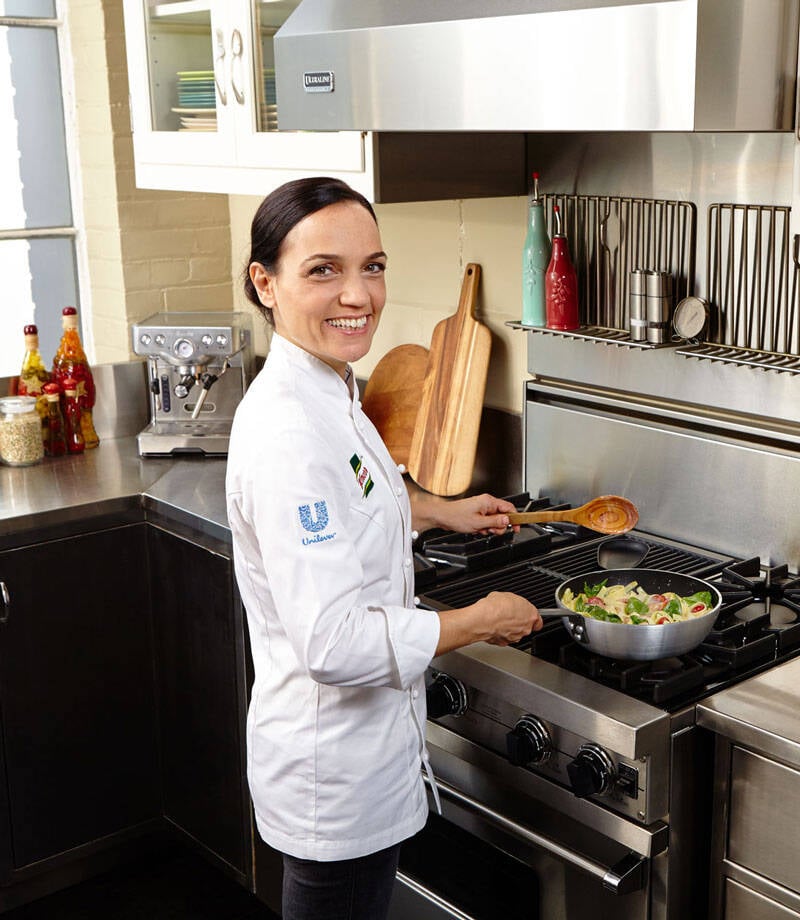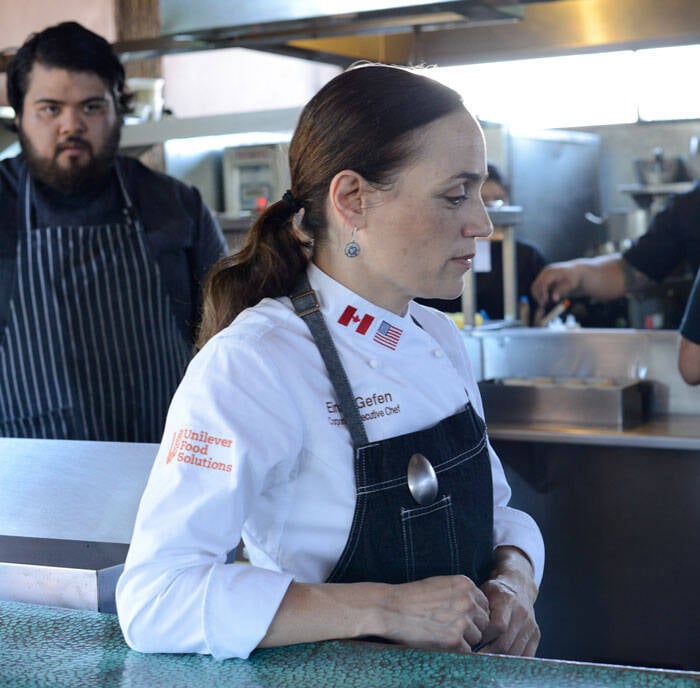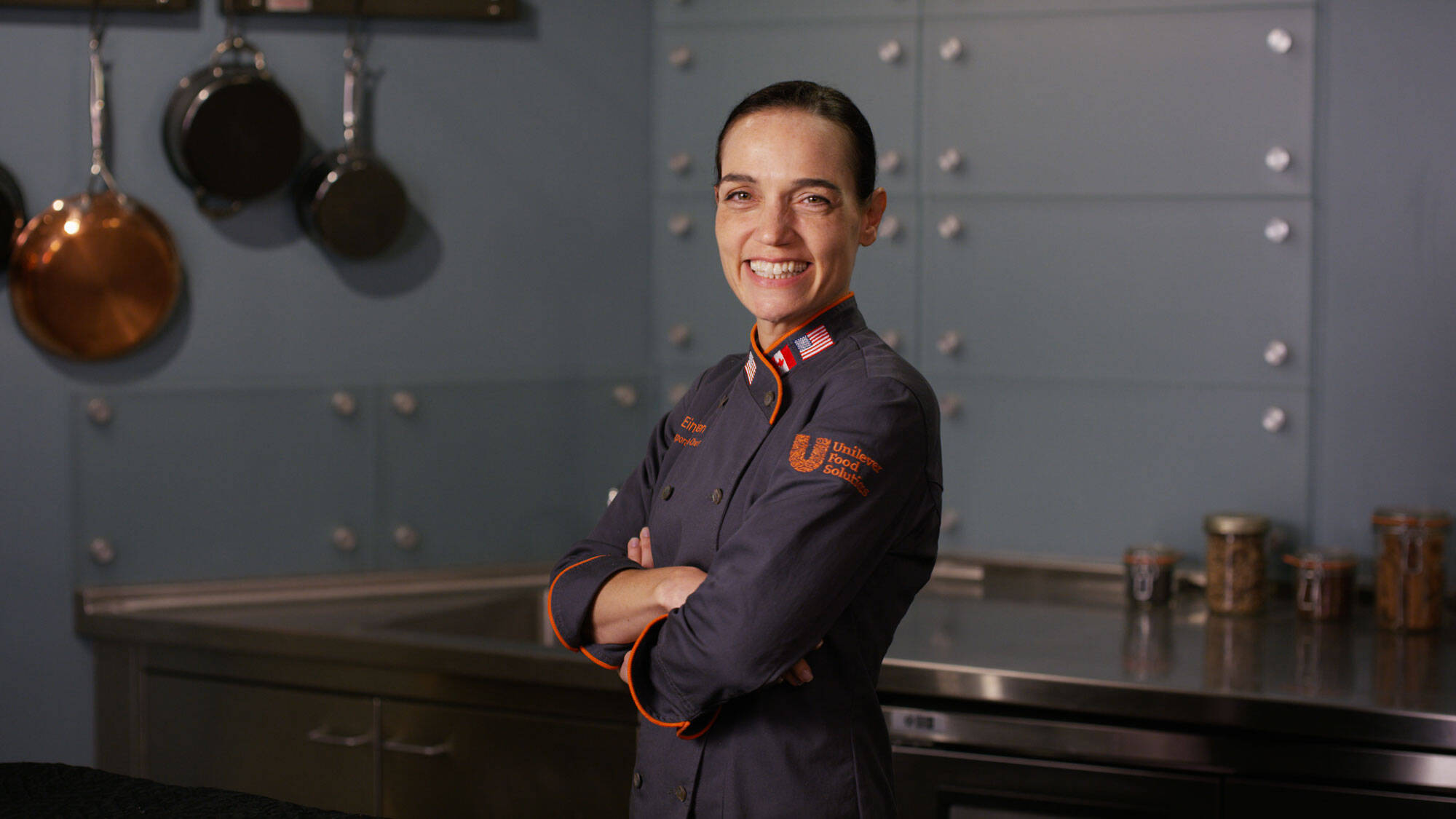How do you contribute to the future of the hospitality industry?
My purpose and the reason I get out of bed each day is to support progress in our industry. Through my network and connections my aim is to shed light on where help is needed and to help provide solutions. Through products and partnerships we’re able to help businesses to survive and thrive during these times. And we can help them to function even better in the future. With our Fair Kitchens social mission we’re creating a platform that enables people in our industry to take care of themselves and their teams while running a profitable business. Mental health and wellbeing are more critical than ever and will create a more positive industry and future.
The #Fairkitchens social mission is a platform created by Unilever. According to them, a fair kitchen is a positive working environment where staff happiness is as important as diner satisfaction. By offering tools, support and training to foodservice and hospitality professionals they want to help build a more resilient and sustainable industry.






“My purpose and the reason I get out of bed each day is to support progress in our industry”

Which role should corporations play in the hospitality industry?
Corporations should leverage their means to reach and influence and help amplify this sustainable message to consumers. They should help untangle the complex supply chain and make ingredients more affordable. Both would help to create a system where everyone can thrive. Change never comes from one side. We are an ecosystem and therefore have to rely on each other to create positive change.
How can chefs play a role in the changing world of hospitality?
Since a couple of decades chefs have become social influencers. Chefs are the people that drive culinary trends, support their communities and leverage the loyalty of their following to vocalize on topics that are close to their heart. All these qualities are of importance while creating a sustainable community and while moving plant forward. Now is the time to be vocal on how difficult it is to make a living in our industry.

“Chefs have become social influencers”

What role should consumers play in rebuilding the future of the hospitality industry?
Consumers understanding the fragility of our industry and frontline workers in the aftermath of this pandemic is of great importance. For one it could help with establishing new forms of payment like higher wages. But hopefully it will also create extra commitment to reservations. And last but not least, awareness should push consumers to dine and order from operations running a fair kitchen with a healthy environment. Now is the time to invest in bringing consumers along for the journey. The decision of where guests should spend their money will be driven more and more and more by shared values instead of just serving popular dishes.
If you would have the opportunity to redesign the hospitality industry with no rules and no limits, what would it look like?
In a perfect world, the industry would be less complex. Small and large suppliers need to work together to simplify the distribution system and to make ingredients more accessible and affordable. It would allow small businesses to have a better margin. Establishing a stable financial system would also allow better compensation and benefits for the industry’s employees, creating a more sustainable workforce and attractive industry. More mentoring and affordable training could create a path for development, and it would allow people to learn more skills. This would tackle the problem of lacking career opportunities and options to grow, that has led to so many strong talents abandoning this industry. Also I think and hope that technology will fortify communication, efficiency and simplification. Ideally sustainability will be embedded in everyday life.
“In a perfect world, the industry would be less complex. Small and large suppliers need to work together to simplify the distribution system and to make ingredients more accessible and affordable”
What will be the biggest differences in change between different countries?
Globally the industry has been hit in similar ways, but the way countries recover may differ. Lack of government assistance in some markets will impact the closure rate of restaurants. In addition, bigger entities (like national chains) may take advantage of the opportunities compared to smaller players, shifting the landscape. In places where technology is more accessible and affordable, operations may find it easier to find alternative income. Countries where the supply chain between farmers, producers, operators and restaurants can be made more efficient will probably recover faster. Placing an emphasis on training, sustaining and building a workforce and a fair pay will also be a key driver of recovery internationally.

What do you think will change on the
long-term?
Due to the consequences of this pandemic, consumers appreciate the out of home dining experience more than ever, not just for the sake of good food or not having to cook, but especially the importance of social connection has become more clear. The coronavirus crisis has also highlighted the fundamentals of health and safety. It has forced many establishments to innovate and pivot to other revenue streams and business models like delivery, meal kits, different on-premise dining experiences and more. Consumers are starting to realize the importance of healthy eating, the costs behind running an operation and the need for a more efficient supply chain. This evolution will drive our industry to ultimately uncover a circuitous food system. Also, due to the consequences of COVID-19, the importance of mental health and well-being isn’t taboo anymore. There should be undeniable understanding that we all need to be our best selves to operate in a stressful environment.
In what way did the coronavirus have an effect on the hospitality industry?
COVID-19 exposed the fragility of our industry on multiple levels. From cash flow constraints to mental health and anything in between. Hopefully a much needed reset will result out of these challenging times, ultimately creating a more sustainable and resilient industry.
Lisa Appels Xiao Er Kong
Corporate Executive chef for Unilever Food Solutions in North America Einav Gefen works closely with her team to engage with chefs from all segments. They also create materials, recipes and campaigns with research and development on innovations. According to Gefen, the coronavirus did a lot of damage to the food and hospitality industry, but it also brought some good.
Creating a more sustainable and resilient industry after COVID-19
Unilevers Einav Gefen on pushing change in the hospitality business
INTERVIEW
5 min
PUSHING CHANGE IN THE HOSPITALITY BUSINESS

How do you contribute to the future of the hospitality industry?
My purpose and the reason I get out of bed each day is to support progress in our industry. Through my network and connections my aim is to shed light on where help is needed and to help provide solutions. Through products and partnerships we’re able to help businesses to survive and thrive during these times. And we can help them to function even better in the future. With our Fair Kitchens social mission we’re creating a platform that enables people in our industry to take care of themselves and their teams while running a profitable business. Mental health and wellbeing are more critical than ever and will create a more positive industry and future.







The #Fairkitchens social mission is a platform created by Unilever. According to them, a fair kitchen is a positive working environment where staff happiness is as important as diner satisfaction. By offering tools, support and training to foodservice and hospitality professionals they want to help build a more resilient and sustainable industry.
“My purpose and the reason I get out of bed each day is to support progress in our industry”
Which role should corporations play in the hospitality industry?
Corporations should leverage their means to reach and influence and help amplify this sustainable message to consumers. They should help untangle the complex supply chain and make ingredients more affordable. Both would help to create a system where everyone can thrive. Change never comes from one side. We are an ecosystem and therefore have to rely on each other to create positive change.

How can chefs play a role in the changing world of hospitality?
Since a couple of decades chefs have become social influencers. Chefs are the people that drive culinary trends, support their communities and leverage the loyalty of their following to vocalize on topics that are close to their heart. All these qualities are of importance while creating a sustainable community and while moving plant forward. Now is the time to be vocal on how difficult it is to make a living in our industry.

What role should consumers play in rebuilding the future of the hospitality industry?
Consumers understanding the fragility of our industry and frontline workers in the aftermath of this pandemic is of great importance. For one it could help with establishing new forms of payment like higher wages. But hopefully it will also create extra commitment to reservations. And last but not least, awareness should push consumers to dine and order from operations running a fair kitchen with a healthy environment. Now is the time to invest in bringing consumers along for the journey. The decision of where guests should spend their money will be driven more and more and more by shared values instead of just serving popular dishes.
“Chefs have become social influencers”
If you would have the opportunity to redesign the hospitality industry with no rules and no limits, what would it look like?
In a perfect world, the industry would be less complex. Small and large suppliers need to work together to simplify the distribution system and to make ingredients more accessible and affordable. It would allow small businesses to have a better margin. Establishing a stable financial system would also allow better compensation and benefits for the industry’s employees, creating a more sustainable workforce and attractive industry. More mentoring and affordable training could create a path for development, and it would allow people to learn more skills. This would tackle the problem of lacking career opportunities and options to grow, that has led to so many strong talents abandoning this industry. Also I think and hope that technology will fortify communication, efficiency and simplification. Ideally sustainability will be embedded in everyday life.

What will be the biggest differences in change between different countries?
Globally the industry has been hit in similar ways, but the way countries recover may differ. Lack of government assistance in some markets will impact the closure rate of restaurants. In addition, bigger entities (like national chains) may take advantage of the opportunities compared to smaller players, shifting the landscape. In places where technology is more accessible and affordable, operations may find it easier to find alternative income. Countries where the supply chain between farmers, producers, operators and restaurants can be made more efficient will probably recover faster. Placing an emphasis on training, sustaining and building a workforce and a fair pay will also be a key driver of recovery internationally.
“In a perfect world, the industry would be less complex. Small and large suppliers need to work together to simplify the distribution system and to make ingredients more accessible and affordable.”
What do you think will change on the
long-term?
Due to the consequences of this pandemic, consumers appreciate the out of home dining experience more than ever, not just for the sake of good food or not having to cook, but especially the importance of social connection has become more clear. The coronavirus crisis has also highlighted the fundamentals of health and safety. It has forced many establishments to innovate and pivot to other revenue streams and business models like delivery, meal kits, different on-premise dining experiences and more. Consumers are starting to realize the importance of healthy eating, the costs behind running an operation and the need for a more efficient supply chain. This evolution will drive our industry to ultimately uncover a circuitous food system. Also, due to the consequences of COVID-19, the importance of mental health and well-being isn’t taboo anymore. There should be undeniable understanding that we all need to be our best selves to operate in a stressful environment.
In what way did the coronavirus have an effect on the hospitality industry?
COVID-19 exposed the fragility of our industry on multiple levels. From cash flow constraints to mental health and anything in between. Hopefully a much needed reset will result out of these challenging times, ultimately creating a more sustainable and resilient industry.

Lisa Appels Xiao Er Kong
Corporate Executive chef for Unilever Food Solutions in North America Einav Gefen works closely with her team to engage with chefs from all segments. They also create materials, recipes and campaigns with research and development on innovations. According to Gefen, the coronavirus did a lot of damage to the food and hospitality industry, but it also brought some good.
Creating a more sustainable and resilient industry after COVID-19
Unilevers Einav Gefen on pushing change in the hospitality business
5 min









